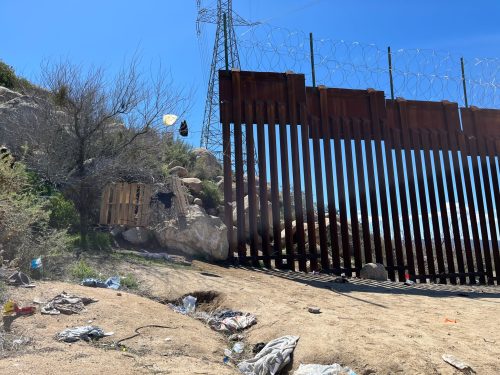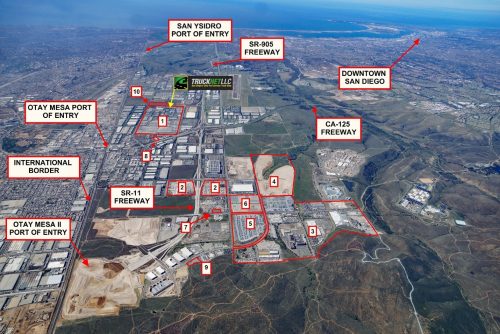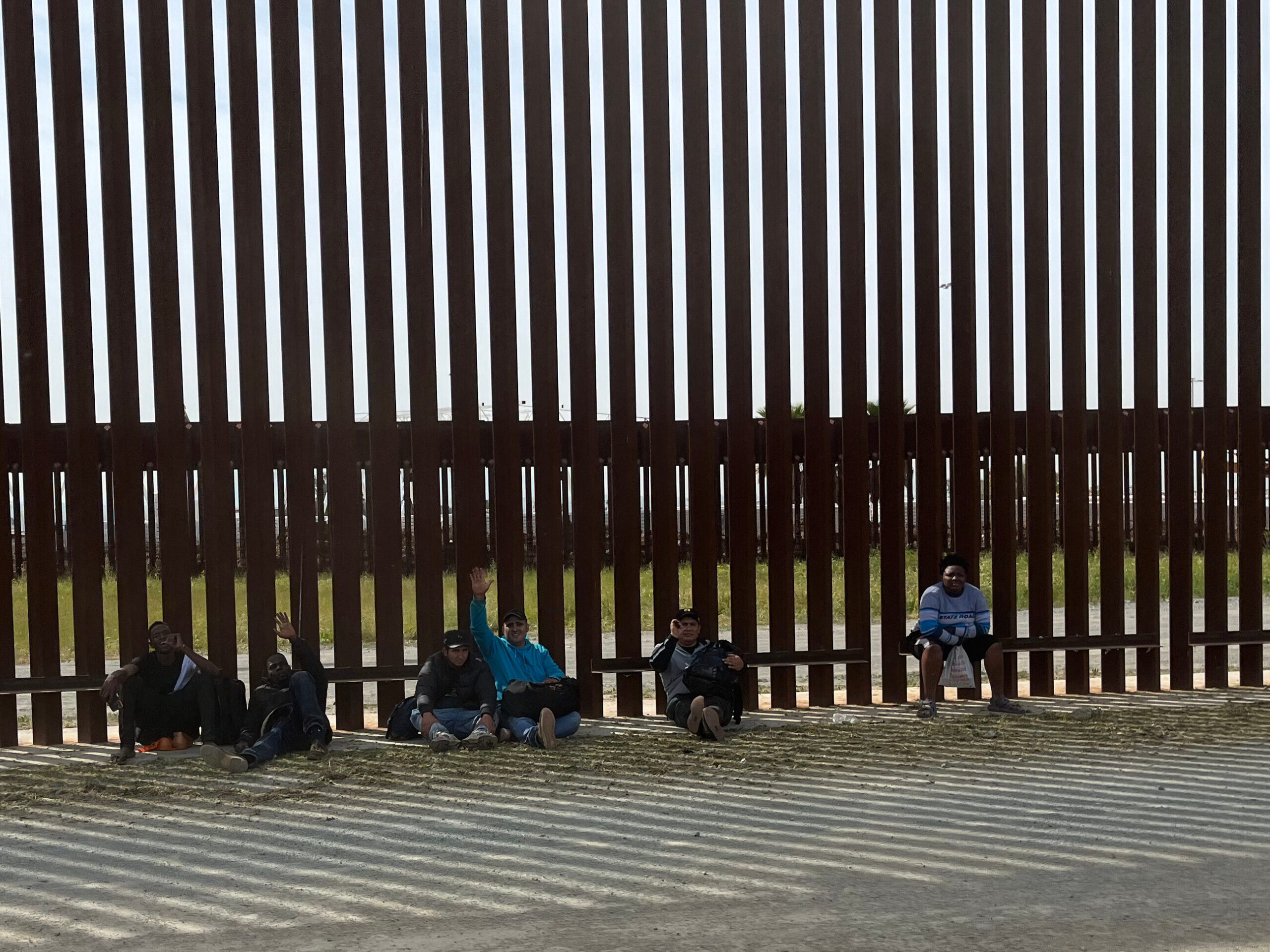Over the past 18 months, The Daily Signal’s Virginia Allen and I have visited the border from the Gulf of Mexico to the Pacific Ocean. What we saw in all our travels was the same: President Joe Biden’s deliberate abandonment of every measure that has worked in the past to reduce incentives for illegal immigration, combined with diminished enforcement of immigration law in the interior, has attracted economic migrants from all over the globe.
People from over 180 countries who want to enter the U.S. but have no legal basis to do so know that the Biden administration will let them in and allow them to stay, so they come. It’s as simple as that.
Last week, we were in San Diego County, California. On the first day, we started about 60 miles inland from the Pacific Ocean at Jacumba Hot Springs, visiting spots along the border wall:

The next day, we went to a San Diego bus station to see busloads of illegal aliens being released after cursory processing by the Department of Homeland Security:

On our last day, we visited Otay Mesa and later walked a couple of miles down the sand from Imperial Beach to the spot where the border wall comes down alongside Tijuana, Mexico, into the ocean:

Nothing makes the value of physical barriers more obvious than the spot near Otay Mesa, where Biden stopped construction cold on the border wall when he took office, leaving a giant gap right across from the outskirts of Tijuana.

The local landowners in Otay Mesa obligingly allowed the U.S. government under the Trump administration access to their land to build a wall, only to be left with a gap that creates a giant unlawful “pathway” into the United States that is used daily by illegal crossers under the Biden administration.
On a visit to the gap last week, we watched one man walk into America through it unimpeded. A small group had already crossed and was sitting in the shade of the wall, waiting for the Border Patrol to pick them up. Not only do they have zero fear of U.S. authority, but illegal crossers now are impatient to be apprehended so they can get released and head to their desired destination—usually a “sanctuary city” such as Boston, Denver, or New York.
Guessing several of this group were West African, I asked in French where they were from. “Mali,” a smiling man replied:

Although Mali has a number of active terrorist groups, chances are no one in this small group was a terrorist or had a serious criminal record. And if they had a criminal record in the U.S., they’d likely have evaded detection entirely as one of the 2 million or so “gotaways” who entered on Biden’s watch while Border Patrol was busy catching and releasing those who gave themselves up.
But we cannot know for sure. It’s a chance we’ll have to keep taking, because there is no way for DHS to verify the information given before it releases people by the thousands every day. Name, date of birth, country of origin, criminal history back home—that all is pretty much taken on trust, since few actually carry identification, and if they do, foreign documents can’t be quickly or easily verified by U.S. authorities.
Biden came to office promising to stop building the wall. That’s because Biden prioritizes illegal immigrant “rights” over U.S. national interests and enforcement of the law—and because border walls work and a completed wall could foil his priorities.
No barrier can keep out 100% of those attempting to enter illegally, but together with sensors and aerial surveillance, walls channel those attempting to enter illegally to spots where human agents can intercept them. With walls, measures to prevent asylum fraud, and meaningful efforts at law enforcement and deportation, a country can successfully defend its borders.
If walls didn’t work, then the Dominican Republic wouldn’t be building onealong its 250-mile border with Haiti on the island of Hispaniola.
The Dominicans are watching their feckless neighbor collapse for the umpteenth time and don’t think they should be forced to accept the fallout from a failed state. A wall with controlled entry points for legal workers and commerce will give the Dominicans control over their sovereignty and who they admit while Haiti turns “into another Somalia,” as Dominican President Luis Abinader told The Wall Street Journal recently.
In contrast, Biden has abandoned finishing the U.S. wall and allows basically free entry. Secretary of Homeland Security Alejandro Mayorkas wants “to be very clear: Our borders are not open.” Yet he admitted recently that over 85% of aliens caught entering illegally at the border are released. A door that opens 8.5 of every 10 times you push on it can hardly be called “closed.”
On our California visit, we saw small groups of people from multiple countries camped out near Jacumba Hot Springs, waiting for the Border Patrol to pick them up and process them for release. We drove back and forth across dirt roads looking for spots where the wall ended at rocks or hills and left gaps through which people had passed, leaving mounds of trash in their wake. Once, we came across Border Patrol vehicles and a group of a hundred or so illegal immigrants they had just “caught” crossing the border.
What happens to them and the thousands of other people the Border Patrol picks up every day?
Those released at the border usually get a “Notice to Appear” in immigration court—in a few months or sometimes much longer—to defend themselves in deportation proceedings. At that point, many have achieved everything they wanted already by being allowed into the U.S., so they don’t bother to show up for their court dates.
If they do show up and claim asylum to avoid being deported, many abandon the process when it gets inconvenient. For those who go all the way through the process, a majority are denied asylum, because they aren’t being persecuted back home and are simply here looking for work (which is not a valid reason for receiving asylum). But then, at the conclusion of a long and expensive process, they stand little chance of actually being deported by a demoralized, defanged, activist-led Department of Homeland Security.
The Biden administration says its “strategy [is] to combine expanded lawful pathways with stronger consequences to reduce irregular migration.” Mayorkas claims that “people who cross our border unlawfully and without a legal basis to remain will be promptly processed and removed.” No one believes this.
Certainly not the people we saw last week in San Diego from Africa, Asia, and Latin America who came here via several other safe countries. They were well aware they could bypass the legal U.S. immigration system, get into the country anyway, and stay.
As White House spokeswoman Karine Jean-Pierre said after the State of the Union address, “Biden believes in treating everyone humanely” and in “not demonizing immigrants.” No one has a problem with that. The problem is that the Biden administration makes no distinction between legal and illegal immigrants. To it, they are all welcome “migrants,” or “newcomers.”
In the San Diego border sector, we asked some Border Patrol agents how morale was. These are men and women who signed up to protect their country. They know what their job should be: deterring and arresting people who enter the U.S. without permission and intercepting drugs and the people who smuggle them. But since Biden and Mayorkas took over their agency, that’s not what they do anymore. They are relegated to working for a glorified social services agency at best, or the world’s most efficient alien-smuggling cartel at worst.
“I hate going to work every day,” one young Border Patrol officer told us. The view from the border is of a country that is losing self-respect. A country unwilling to enforce its own laws will descend gradually into anarchy, a state that will eventually attract few willing to defend it.
The BorderLine is a weekly Daily Signal feature examining everything from the unprecedented illegal immigration crisis at the border to immigration’s impact on cities and states throughout the land. We will also shed light on other critical border-related issues like human trafficking, drug smuggling, terrorism, and more.
Simon Hankinson is a senior research fellow in the Border Security and Immigration Center at The Heritage Foundation. Reproduced with permission. Original here.
